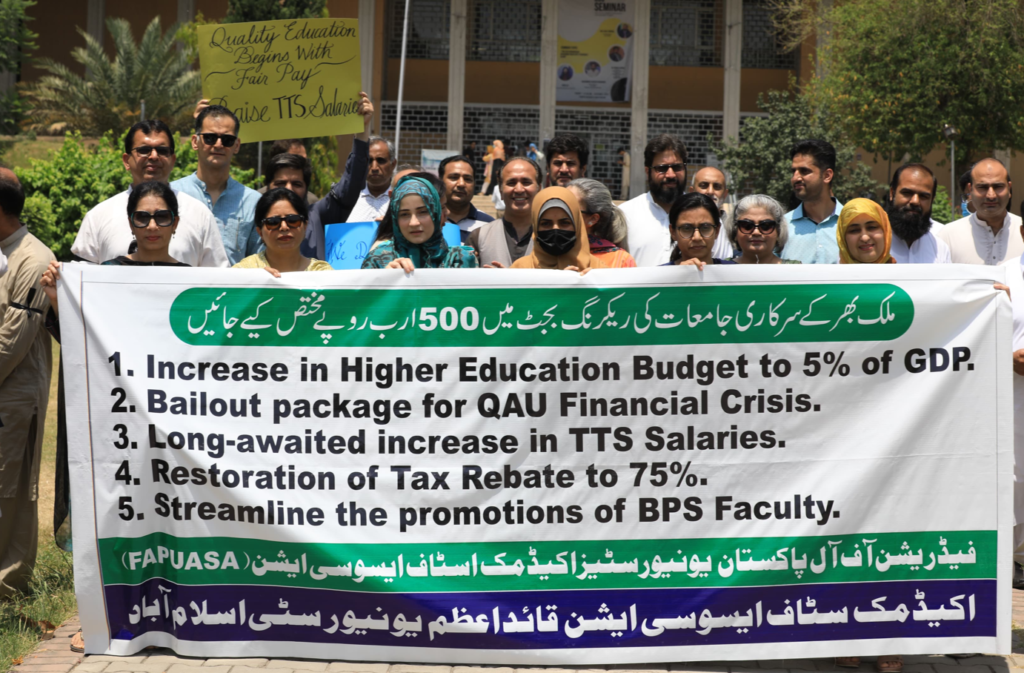Budget Shortfalls Threaten Quality of Education: ASA Speaks Out
News Desk
Islamabad: The incumbent government of PML-N has pledged in its manifesto to increase education spending to 4 percent of GDP, enhancing budgetary allocations for education at both federal and provincial levels, and providing need and performance-based grants to universities.
Similarly, the PPP manifesto has promised to allocate at least 5 percent of GDP to education. Given these commitments, it is crucial that these political parties support education in general and higher education in particular.
These sentiments were voiced by participants during a peaceful token protest organized by the Academic Staff Association (ASA) of Quaid-i-Azam University (QAU) in Islamabad, where they stressed the urgent need for government intervention and financial support for public sector institutions across Pakistan.
The ASA representatives emphasized that the financial viability of many higher education institutions is currently precarious, with numerous institutes struggling to cover regular monthly salaries, pensions, and other routine expenses.
This funding is essential for improving the financial condition of universities, supporting high-quality education, and promoting cutting-edge research. 
“In the fiscal year 2023-2024, the government allocated a mere 1.6 percent of GDP to education, the lowest in the region. Within this allocation, higher education received only 0.44 percent of GDP as a recurring grant.
Since the fiscal year 2018-2019, the Higher Education Commission’s (HEC) recurring grant has stagnated at Rs 65 billion.
Concurrently, the prices of gas, electricity, petrol, and diesel have increased steeply since 2018. These financial pressures have placed an unsustainable burden on university expenses across the country” they added.
Dr Mazhar Iqbal, President of the ASA at Quaid-i-Azam University who is also Vice President of the Federation of All Pakistan Universities Academic Staff Association (FAPUASA) stated that the current ruling political parties in Pakistan have acknowledged these challenges in their 2024 manifestos.
QAU Alumni Demand Flagship Institution Status from Federal Govt
It was also highlighted that the government has increased the salaries of government employees by nearly 60 percent since 2021, yet Tenure Track System (TTS) faculty have not seen comparable adjustments.
The TTS system was introduced in Pakistan in 2007 to attract and retain young faculty with competitive, performance-based salary packages, though they were deprived of pensions and death/Prime Minister Assistance package.
According to policy, TTS salaries must be revised every three years but have only been revised three times: in 2011, 2015, and 2021.
Additionally, the tax rebate for faculty, which was 75 percent, was reduced to 25 percent by previous governments. It was also observed that BPS faculty may be given a fair chance to compete for next cadres and their timely promotions should be taken up seriously wherever that is required.
HEC Chairman Vows to Push for Budget Increase for Universities
ASA Quaid-i-Azam University requests Prime Minister Mian Mohammad Shahbaz Sharif and President Asif Ali Zardari to immediately take up this matter to extend government support and adherence to the educational funding commitments outlined in political manifestos, 4 to 5 percent of the GDP.
Further, he demanded to increase TTS salaries by 60 percent and link it with the annual budget, maintain pension and extend death /Prime Minister Assistance packae to these highly qualified faculty, and a 75 percent tax rebate in the current budget with focus on BPS faculty career path for promotions.

Comments are closed.